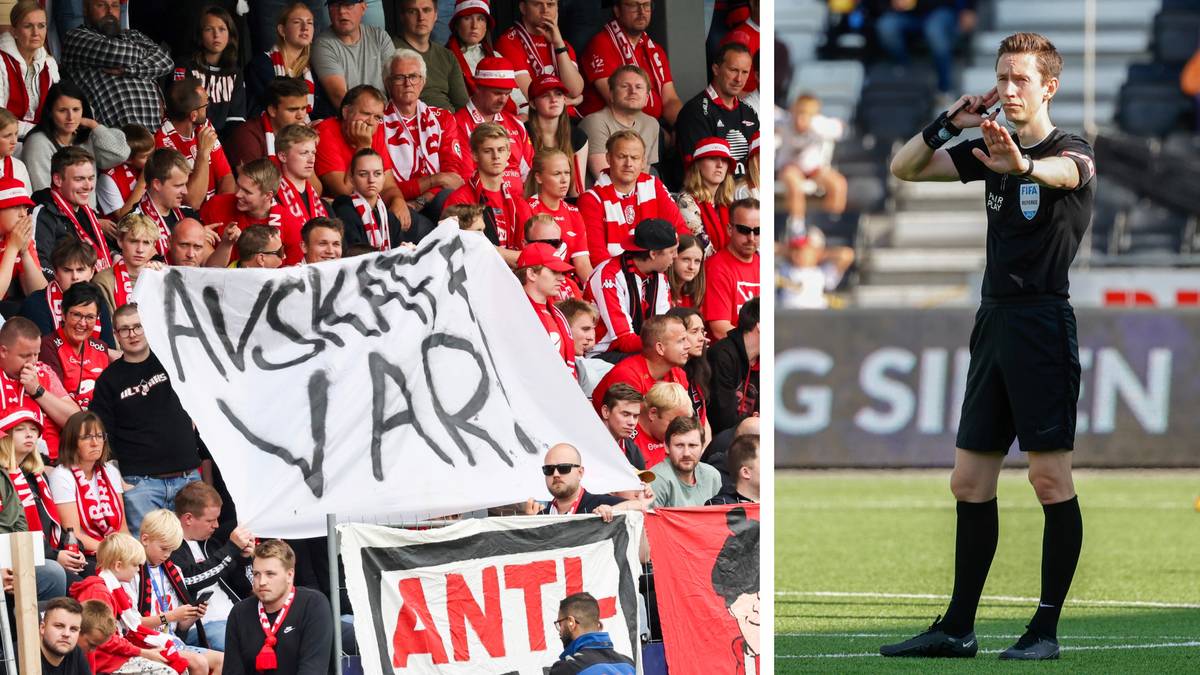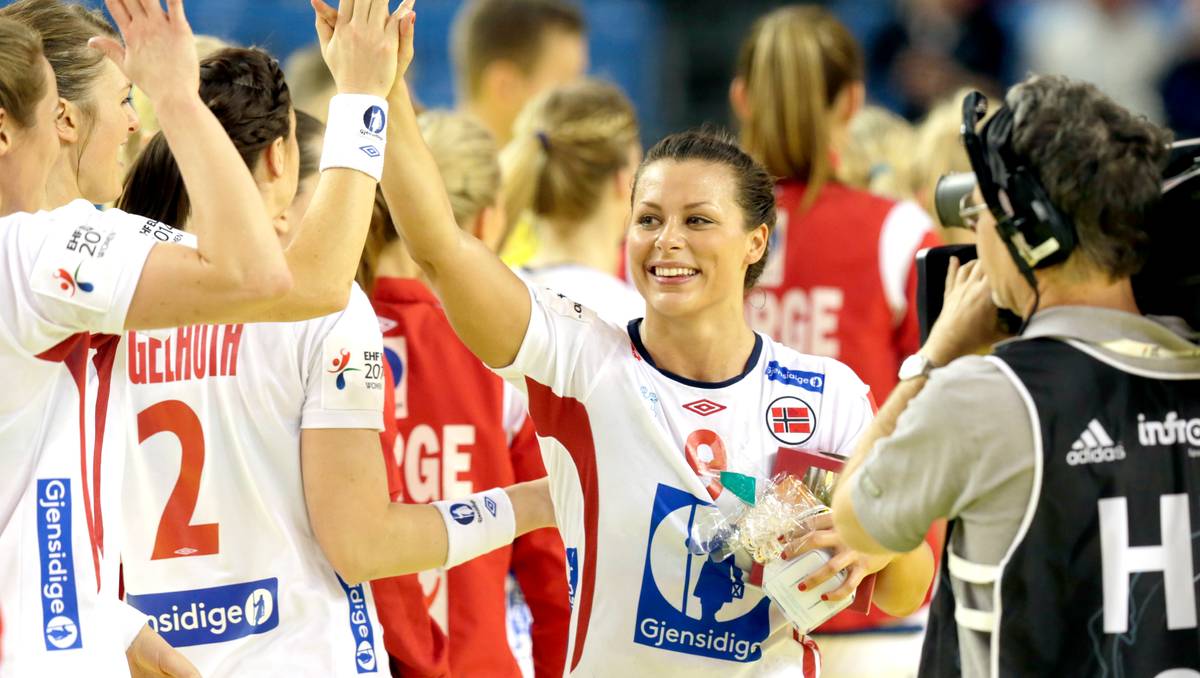“Can’t you just remove VAR if it’s not working properly?”.
A Finnish journalist asked. And it was really quiet. Completely shaking, almost dead silent.
UEFA’s strong chief referee, Italian Roberto Rosetti, approached the Finnish representative with long, powerful strides, stared at him for a long time and said in a dark voice: “No.”
REFEREE: Roberto Rosetti.
Photo: Dmitri Lovetsky / AP
And then the discussion is over. It is located at the headquarters of the European football confederation, UEFA, in Nyon, Switzerland. Those who manage football in our part of the world have invited the media to talk about how football is managed. VAR is certainly one of the central themes.
However, the session did not provide space to discuss the existence of the system in the future. As if that has become one of the absolute truths in football.
New Sunday liturgy
Here at home, Norwegian football is undergoing its first season with a VAR system in the Eliteserien. And its supporters refuse to agree that this is something you really want.
VAR protests have become a regular part of Sunday’s match liturgy.
For ears that are more or less hard of hearing.
The desire for self-criticism has so far been evident in the NFF’s excellent chief referee, Terje Hauge.
But in general, the Norwegian football manager sounds like a pre-programmed robot. What is equally clear in Norwegian football and elsewhere in Europe: VAR is here to stay.
As recently reiterated by the new sporting director of Norsk Toppfotball Erik Hoftun last week.

NEW SPORTS MANAGER: Erik Hoftun on Norwegian Top Football.
Photo: Ole Berg-Rusten / NTB
Psychologists and anthropologists have said and will continue to say many things about humanity’s fascination with technology.
But that attraction easily devolves into short-sighted beliefs and into completely misunderstood loyalties.
So here too.
VAR’s curious reception has turned to disappointment and then resignation.
Because clear answers are still as scattered as ever.
And it’s almost impossible to know what VAR has added to football in a positive direction.
Apart from destroying the dynamic and dampening spontaneous joy.
But notso say stop.
None of them have actually decided to dare to try to convince football fans that this is a genuine necessity, because none of those who organize football would.

WC DEBUT: Men’s football WC in Russia is historic. For the first time, a jury used video images to make a decision.
Photo: FRANCK FIFE / AFP
Rich man’s table
Because there is a belief among those paying for this that it will make football a more valuable product for future generations.
And then VAR was introduced to appease the big sides. The richest and most powerful clubs are tired of losing revenue due to wrong refereeing decisions, which knock them out of attractive tournaments. And it worked.
When VAR, which is the English acronym for video-assisted refereeing, was introduced on the international stage during the World Cup in Russia in 2018, it also created an independent form of excitement.
Everyone immediately realized that the established dramaturgy of football had been challenged.
The new lead actor has found a place in the script.
But without hearing the dialogue.
The referee received a message in his ear that no one else heard and walked to the screen that no one else saw. Decisions suddenly change, without anyone fully understanding why. As with any technology, there has been real progress since then
But that doesn’t change the basic objection:
Football has not become a better product. Not for TV viewers, and certainly not for stadium audiences.
There is very little indication that this also happens to the players on the pitch.

SEVEN MINUTES: The VAR check after Odd’s 1-0 against Vålerenga was long and lasting, and the players on the pitch were clearly distraught.
Photo: Tor Erik Schrøder / NTB
In every third match
Minimal interference for maximum benefit’ is the slogan used for VAR.
According to UEFA’s head of referees, Rosetti, the VAR system in 1,377 matches until 2021 ultimately corrected the decision of the referee trio in 479 cases.
The decisions are distributed evenly between goals and penalty situations. 7% of corrections involved a red card.
Therefore, the system has changed the referee’s decision in about 1 out of 3 matches.
Which is meant to be an argument that it doesn’t interfere with the experience as much as critics claim.
This can also be used as an argument that the entire system is a wasteful use of resources.
Here at home, criticism should be mitigated by trying to reduce the amount of time spent. A decision that took seven minutes to confirm in the match between Odd and Vålerenga illustrating the absurdity of the use of this upgrade and further increasing the anger of many players.

POWERFUL REFEREE: Italy’s Roberto Rosetti shows off the VAR space used in connection with the 2018 World Cup.
Photo: Dmitri Lovetsky / AP
A question about timing
Time consumption should be reduced. But no one knows how. Or how much. Because if you have a system that doesn’t provide immediate solutions, you also have problems. If you can’t make a decision in seven minutes in a remote room full of screens, you don’t need this.
Then the men in black will probably be allowed to continue making these decisions.
One of the reasons for implementing VAR is to reduce anger towards referees. But his expression of displeasure only changed. Now the referee has become a symbol of a system that is increasingly creating frustration.
The solution must be found in some cameras. For that someone has to pay. Without wanting to talk about it out loud. So far, VAR costs Norwegian football around NOK 15 million in one season. TV 2 rights holders are still paying for the bulk of this – and are probably the only ones who can be said to have gotten back what they hoped to get out of their investment. For providing all the editorial and temperature content one could only hope for.
But that doesn’t make for a better experience for Norwegian football. Then the question is how long the clubs, through their interest organization Norsk Toppfotball, are willing to spend money on this.
In Sweden, both supporters and clubs have done so so far absolutely not, also for financial reasons. And the implementation of VAR has been postponed until 2024 at the earliest. If ever.
Soul vacuum cleaner
VAR must fulfill the desire for greater precision and fairness. Modern and democratic ideals themselves.
But in the context of football, it only serves as a vacuum cleaner for the soul.
You create a sterile, technological football, where everything becomes a simplified and over-controlled entertainment product with ever softer seats for an ever more anesthetized audience.
In a more philosophical context, this also changes one of the most important reasons for football’s unique popularity – namely its egalitarian and classless nature. The fact that, by and large, football is the same, wherever you are. Whether it’s on the plains in Dakar, Namsos or Rosario or at hyper-modern Wembley in London.
Now one sport will be governed by how many cameras are placed around the track and another one outside the track. But even an infinite number of cameras can’t replace the lost immediacy and passion.
And supporters have realized that. When they protested, the reasons were the same as when England fans took to the streets to demonstrate against the implementation of the European Super League.
This is a protest against impotence and cynical rejection.
It’s okay to be Tofiq
And then there’s this quarterback.
The most debated episode in football history occurred at Wembley in London on July 30, 1966. The scene was the World Cup final between home nations England and West Germany.
The score was 2-2 and it had reached the 11th minute of the first extra round. England striker Geoff Hurst received the ball in the German penalty box, turned and fired a shot that hit the crossbar and went down.
The referee was unsure whether the ball was inside the line when it bounced and ran out to consult with the assistant referee on the sidelines. After a brief chat, he concluded that he believed the ball had gone in, and a goal was awarded. England led 3-2 and finished as world champions.
The assistant referee who thought he had seen movement in the goal and believed the ball was inside the goal line was called Tofiq Bahramov. and has since earned the nickname “Russian line guard” in Great Britain. This name is wrong. Bahramov was from Azerbaijan, not Russia – but both countries were then part of the Soviet Union.

TOFIQ ON THE PEDAL: Of course Tofiq Bakhramov has his own statue outside the Tofiq Bakhramov Stadium in Baku. Here former England player Geoff Hurst is pictured in front of the famous linesman.
Photo: RUSSELL BOYCE / Reuters
Since then, conversation in the world of football has focused on whether the ball actually went in. And this has moved into science, where modern technology has been tried several times to reconstruct the event. With different results.
The only safe conclusion today is Tofiq Bahramov deciding the WC final.
And this has never happened today.
And with that, football has lost one of the enduring stories and discussions that made the sport the most popular in the world.
Tafiq Bahramov is someone who follows his inner beliefs. Today’s football managers have a lot to learn here.
Has football been improved by VAR? Is there any harm if it is removed?
It’s okay to answer “no”. Belief in human strength is permitted.
That’s why the national arena in Baku is called the Tofiq Bharamov Stadium.

“Infuriatingly humble coffee guru. Travel practitioner. Freelance zombie fanatic. Certified problem solver. Food scholar. Student.”






